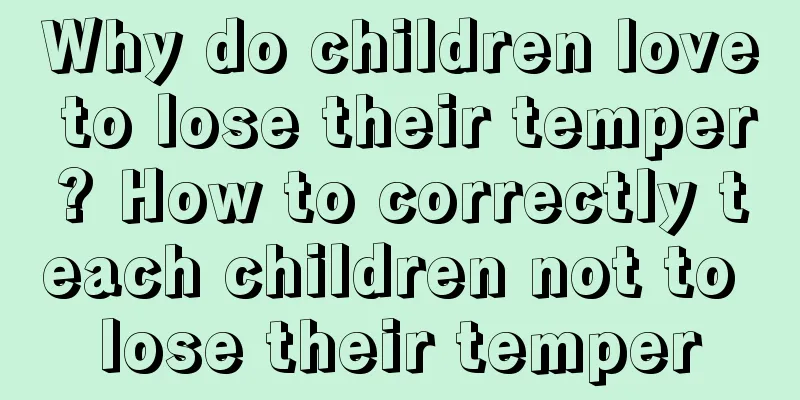Why do children love to lose their temper? How to correctly teach children not to lose their temper

|
Nowadays, children in every family are treasures. Adults may not be able to help but want to be good to them, but there is no guarantee that they will not spoil the children. Children's education has become a huge problem nowadays. Today we will understand why children are prone to temper tantrums. Why do children lose their temper?1. Genetics: 1. If one of the parents is particularly prone to temper tantrums, the child may also inherit this trait and become prone to temper tantrums. 2. The mother's mood is unstable during pregnancy, such as being in a bad mood and anxious, which leads to endocrine disorders, or being frightened by an accident, and the mood changes drastically, which will directly affect the child through the placenta, causing the child to have a bad temper and a withdrawn personality after birth. 3. The mother takes medicine during pregnancy, which affects the normal development of the child's nervous system and is also likely to make the child sensitive and irritable. 2. The child is unwell. The child may be often weak and sickly, or suddenly feel unwell. Being tortured by illness will cause the child to be particularly sensitive. 3. Personality assertion gradually emerges As children grow up, they gradually have their own opinions. Moreover, due to their unique "egocentric" thinking, they also particularly reject other people's "different" ideas or behaviors. 3. Want to attract attention Sometimes children want to get more attention from their parents, and choose to lose their temper and other behaviors to attract their parents' attention. 4. Children whose wishes are not met find it difficult to tolerate the reality that their wishes are blocked, but at this time their ability to express themselves in words is still relatively limited, and they find it difficult to express their resentment, so it is natural for them to express their emotions by losing their temper. How to teach your children not to lose their temper1. Children's temper tantrums are directly related to their parents. In a family, if one of the parents is prone to temper tantrums, then the child will often lose his temper. As a parent, don't always lose your temper with your children. If there is a problem, solve it instead of losing your temper. 2. If parents encounter some unhappy things at work, they should not go home and lose their temper with their children. This will not only make the children like to lose their temper casually, but also make them become taciturn in daily life. 3. If the child does something wrong, parents should teach them patiently and not lose their temper over trivial matters. Parents should not lose their temper with everyone around them in their daily lives. 4. Parents should tell their children that smile is the most beautiful language in the world and they should learn to smile when they see people around them. A child who can smile can be liked by people around him. 5. When children encounter very difficult problems, do not let them down, and do not let them feel lost and disappointed about the problems in life. Stay with them, analyze the problems with them, and solve them. 6. Tell your children that "a child's temper is like a nail in someone's heart". Through this story, I hope your children will not lose their temper casually. Children should know that even if the nail on the tree stump has been pulled out, there are still many holes. Losing your temper will hurt people's hearts. How to teach children to control their emotions1. Acknowledge and accept your child’s anger Only by accepting their angry feelings and the reasons for their anger can children have room to learn empathy and anger coping skills. If parents refuse to acknowledge their feelings, it will be detrimental to the establishment of self-awareness. 2. Learn empathy When you listen to your child express angry emotions, you give him space to work through his anger. As long as you consistently accept your child's angry emotions, it will teach him to be less emotional. To think more and not react so violently right away. 3. Teach children problem-solving skills The more children practice and rehearse how to solve problems instead of reacting to things instinctively, the more their body's nervous system can help them control their anger. Parents can repeatedly practice with their children, "What would happen if you hit someone instead of walking away when you are angry?" or "What are your other options in this situation? How can you solve the problem?" 4. Parents should set clear rules Parents should clearly define what behaviors are acceptable and what are not. Although we accept children's feelings, it does not mean that we accept their bad behaviors. For example, hitting, throwing things, disrespecting people or destroying anything are not allowed. Let the child participate in the formulation of the punishment method, so that he will be more likely to follow the rules. Only by controlling the child's bad behavior can you give the child a space to accommodate his emotional safety. 5. Teach your child how to relax Teaching your child to take a deep breath when they are excited will change the way they deal with impulses. After repeated practice, it will become a natural reaction for your child. 6. Build children’s trust in their parents Don't blindly ignore your child's emotions, but build up your child's trust in you. When your child cries, don't say "Stop crying!" Instead, ask your child, "I know you're angry, and I might cry too." This will put you on your child's side, and he will trust you more, and he will know that he can rely on you no matter what happens. If your child asks you to go away when he's angry, you should tell him, "I'm right next to you, tell me when you need me." 7. Correctly distinguish between yourself and your children Parents must always remind themselves that we are adults. When children are excited, we should not get excited. If you stay calm, children will feel safe. If children see that their parents are also angry, they will feel scared and worried. Only when parents are calm will children know that they are safe. 8. Teach your child to recognize the signs of impulsivity When you see that your child is too tired or crying, you should let him/her rest as soon as possible, and don’t wait until he/she does something impulsive before intervening. Children themselves should also learn to recognize these impulsive signals. How should parents manage their emotions?1. Face up to the existence of emotions There are good and bad emotions, but there is no right or wrong. First of all, you should face these emotions. When your child makes you angry or disappointed, you should first understand that these emotions are very reasonable. Then tell yourself not to let these emotions take over your mind, take a deep breath, and calm yourself down. Secondly, you should understand that these emotions are normal, and your child’s anger is also normal. 2. Be the "unexpected" parent of your child If you are really driven to the edge by your child's provocative behavior or mischief, it is better to do something unexpected. Through actions such as hugging, you can effectively let your child know that you hear his dissatisfaction and you sympathize with him, but you will still stick to your principles. 3. Give yourself some time to relax Instead of asking your child to stand in a corner to calm down, you can calm down for a few minutes. At this time, you can say to your child: "Mom, Dad needs a few minutes to calm down and think about how to help you better." At the same time, you can set a good example for your child: when you have bad emotions such as anger and confusion, you should deal with your emotions. |
<<: What are the types of formula milk?
>>: What is Lansinoh? A maternal and infant brand that helps breastfeeding
Recommend
What to do if you feel sexually cold after giving birth? Sexual life is not harmonious after giving birth
Many mothers lose interest in sex after giving bi...
Nursing measures for acute mastitis How to treat acute mastitis
Many mothers suffer from mastitis due to improper...
Can Yunnan Baiyao toothpaste relieve toothache? Which Yunnan Baiyao toothpaste is the best?
Yunnan Baiyao toothpaste is a medicinal toothpast...
How old is the baby suitable for wearing underwear? What are the benefits of wearing underwear for babies?
In real life, many people think that babies are s...
What are the hazards of pregnant women stopping work and resting too early? The impact of pregnant women's anger on the fetus
During pregnancy, the hormone balance in the body...
Mom recommends: Moony Japan's top-grade wet wipes are super easy to use
Products for babies are not the most expensive, b...
How many pieces of clothing can be put in a laundry bag at a time? Is it better to have a coarse or fine mesh laundry bag?
Using a laundry bag to wash clothes can prevent t...
New parents must read: Tips on how to let your baby eat by himself
In order to make their children eat well, mothers...
Can babies eat red grapefruit? Can pregnant women eat red grapefruit?
Now is the season when grapefruits are on the mar...
What should pregnant mothers do when they have toothache? Can they take medicine for toothache during pregnancy?
Some women have toothaches during pregnancy, but ...
Will pinching a baby's nose make it straighter? What are the harms of pinching a baby's nose?
There is a saying that if you pinch the nose freq...
Can a baby sleep on a pillow when he/she spills milk? Can a baby sleep on his/her side when he/she spills milk?
It is very normal for babies to spit up milk. Man...
What is the white color at the corner of the baby's mouth? How to detect thrush in time
Sometimes when mothers are feeding their babies, ...
How to educate a disobedient child? Should a disobedient child be spanked?
Educating children is a very complicated and long...
How about the Meco Blue Fatty milk powder? Dedicated to maintaining the baby's immune system
All mothers know about Meco-Breast Milk Powder be...









